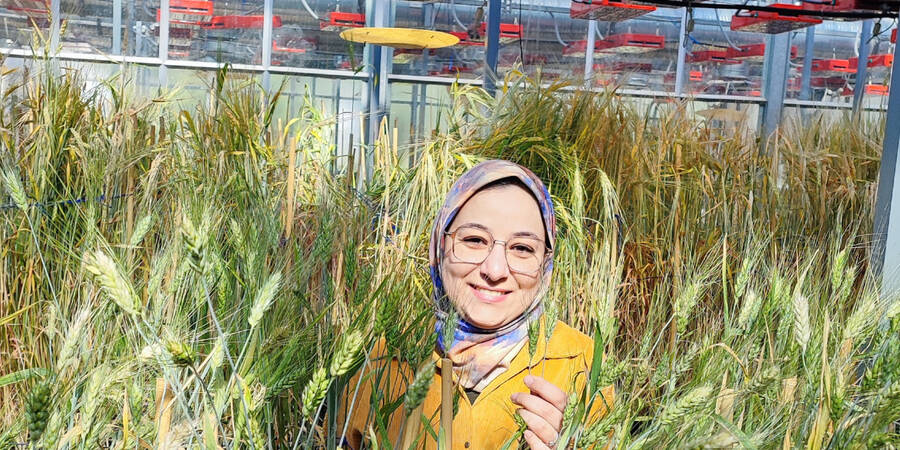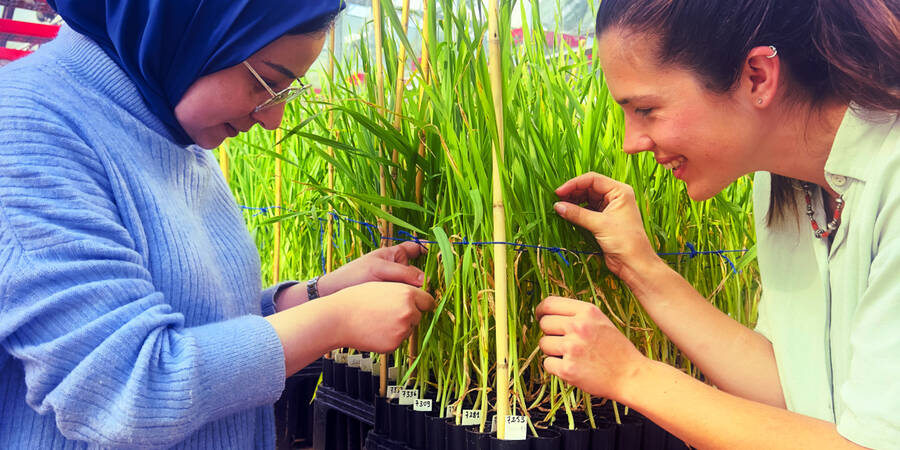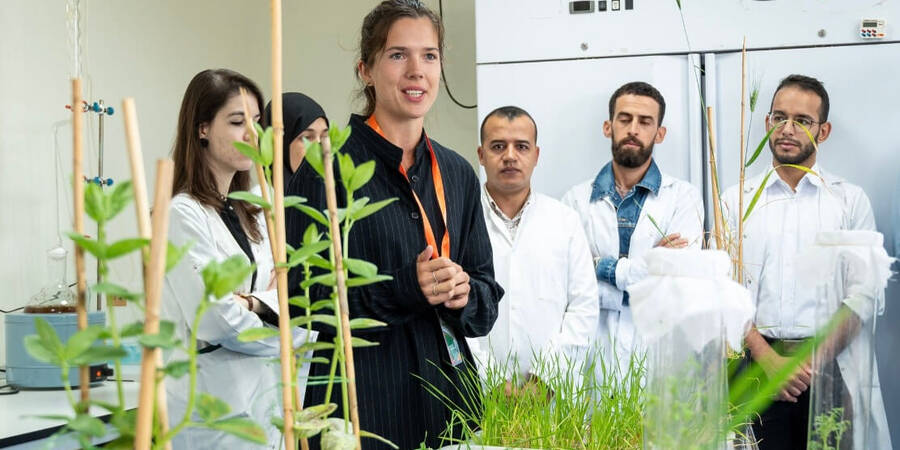Breaking Barriers and Cultivating Change

The International Day of Women and Girls in Science advocates for equal opportunities and inclusion across science, technology, engineering, and mathematics (STEM). ICARDA actively promotes workplace gender equality, and we are proud to focus on women and youth empowerment as one of our cross-cutting research themes. As women’s involvement in dry area agriculture grows and male migration to urban areas increases women’s workload, ICARDA and CGIAR investigate the impact of gender gaps on equitable and demand-driven development.
We spoke to Dr. Anna Backhaus and Dr. Hafssa Kabbaj about their experiences as women working in agricultural research. They highlight existing disparities and suggest ways to combat these challenges. ICARDA shares their ambition to encourage more women to pursue science careers. Diversity in science and research is the key to achieving our goal of identifying transformative approaches that enhance women’s productivity, food security, and income opportunities to eradicate gender-based inequalities.
--------------------------
In this fight against climate change, we need “all brains on.” Women need to be involved because we simply cannot afford to lose any great potential scientists, and in agricultural research, we need the important point of view of women farmers, who make up 43 percent of the world’s agricultural labor force. However, for many reasons, women farmers bear a disproportionate burden, so they will be directly affected by policies, solutions, and research, and their experience, expertise, and participation are vital. Women and girls must also have equal opportunities to study and have a career in science, research or policymaking and make impactful contributions. The climate crisis is rapidly unfolding and impacting us all. It is crucial to ensure that women are afforded equal opportunities as men to address and mitigate this crisis.
Working in research can be challenging for everyone. Funding is limited, and permanent positions are scarce. Women are unequally impacted, as this competition often coincides with when a woman might choose to have children. And I don’t think it is the difficulty of combining career and family that is the challenge, but rather the persisting prejudice we often face that women are not as willing or capable to pursue a scientific career beyond this point.
In fact, many women find themselves answering questions about family planning. I have been told in my career that “women are simply not as capable as men in performing certain tasks,” especially fieldwork. These prejudices, the day-to-day burden that many women bear because of misogynistic behavior and attitudes, as well as the pressures of some traditional family constructs, can all contribute to women not moving up into senior positions and exacerbate this cycle.
Having said all this, I want to point out that I am very fortunate and have mostly worked with wonderful women and men who tried to change the status quo and supported my studies and career. This gives me a lot of hope for the future.

I believe increasing the visibility of female scientists will help. Within the research community, we can raise online profiles and ensure equal representation at meetings and conferences. However, it's also very important we reach the wider society. Especially introducing female scientists to children through educational outreach and school curricula. Historically, brilliant women and their contributions have been minimized. Therefore, girls lack role models and are discouraged from believing that they could become astronauts, mathematicians, biologists, or anything else they want. I think we also need to acknowledge the impact popular culture can have and use it as a force for good. How many movies about brilliant female scientists exist? These would encourage girls to study STEM and, more importantly, change their families’, friends’, and society’s views on women working in science.
Be proactive: identify the problem, get help from peers and mentors, and challenge the hurdles together! At my previous workplace and at ICARDA, we have formed female support groups and networks. This has been incredibly powerful and supportive. It raises awareness of our challenges and value, helps everyone gain a stronger sense of belonging, and it is easier to solve problems together. Through our group at ICARDA, we don’t only support each other, we also raise the visibility of all women – for example through organizing trainings and seminars by women, showcasing their knowledge and expertise. This is especially important as the research sector is far from gender-balanced, so most seminars are still given by men.

I feel lucky to have been surrounded by supportive supervisors during my career. Gender equality and equal representation of women is a challenge in so many sectors – and agricultural research is no exception. It’s great that for many years, ICARDA has taken active steps to increase women’s inclusion across all levels. But it does raise the question of why we still face challenges in achieving gender balance. Hiring female employees is the initial crucial step, while retaining them poses the next obstacle. To accomplish this, we must consistently enhance working conditions for women by offering training opportunities for all staff members.
We are extremely fortunate to have Dr. Dina Najjar working at ICARDA as a gender specialist to improve gender inclusivity in our research. Her activities are interwoven across most projects, which means we can have measurable, positive impacts on women farmers. We can all learn from her work and determination.
Oh, there would be a long list of role models, from Marie Skłodowska-Curie to Mae Carol Jemison.
However, two scientists have had a direct impact on my career. Firstly, Professor Diane Saunders, who was my mentor and helped me throughout my PhD. She then supported us in forming the ICARDA network, inviting us to training events in the UK, and this year we started working together on a research project. But more importantly, she is a great example of how to be a brilliant and kind leader in science.
Secondly, Dr. Alison Bentley. She kick-started the idea of informal networks supporting diversity by creating the first Women in Crop Science network. Hafssa and I are very grateful to her for inspiring our group at ICARDA. It’s encouraging to see her and also Dr. Ismahane Elouafi taking up senior leadership positions at CGIAR. The positive impact they have already made is inspirational. However, the percentage of women in senior positions and executive leadership across CGIAR has plateaued at 30–35% since 2020. We need to persist with progress so we can ensure that future researchers have even more female role models than we do.
I believe we are on the right path, but everyone can always improve! We already have many outstanding women working at ICARDA, so initiatives to raise profiles, communicate achievements, and increase online visibility will provide fantastic results – like this interview!
However, I’d like to see more female scientists in senior positions. Hiring women is an important first step, as is improving our hiring strategies to avoid bias through training and increasing diversity of interview panels. However, as Anna pointed out, being able to retain women so they can climb to leadership positions is the next hurdle. We need to look at improving the fostering of inclusive and diverse workplaces through training and empowering young women with the tools they need to become the leaders of tomorrow.

We need to remember that only when we have truly diverse teams can we successfully overcome the diverse challenges of climate change and food security. Gender balance has not yet been achieved across the CGIAR, but since 2020, there has been an 8% increase in the proportion of female research staff, which is at least a positive development. But it needs to improve.
To attain genuine equality, there should be no distinction between the roles of men and women. My aspiration is that in 50 years, the necessity for special days to acknowledge women in science will no longer exist, and, in general, there will be reduced emphasis on an individual’s gender.



